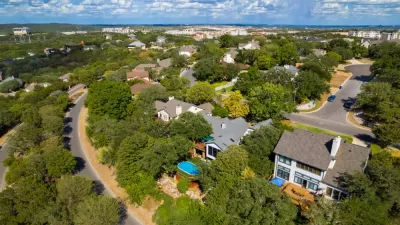Citing a dire housing situation for low-income renters, Columbus, Ohio is considering its first community land trust. The aim is to create housing alternatives for low-income residents of revitalizing neighborhoods.

According to a 2017 report, Jared Brey writes, rents are rising faster than incomes in Columbus, Ohio, while the number of residents in poverty is going up faster than the total population. "On top of all that, more [than] 10,000 housing units built in Columbus with federal subsidies have affordability requirements that expire in the next five years."
The City of Columbus and Franklin County may join forces to develop permanently affordable for-sale housing on vacant lots owned by their land banks. The pilot community land trust would start out small: $3.8 million and just 30 or 40 homes to begin with.
The community land trust would build on the land banks' solid anti-blight record. "In the last five years, according to a recent study, the city and county land banks combined have demolished 1,600 blighted buildings, helped find new uses for 1,300 properties, and reduced the overall level of vacancy in the city by 18 percent,' Brey writes.
Backers of the project say it will preserve the ability of mixed-income residents to buy (or, in reality, long-term lease) houses in neighborhoods that are revitalizing. Meanwhile, Columbus voters may also approve a $1 billion bond package in the upcoming May 7 general election that includes $50 million for affordable housing.
FULL STORY: Keeping Affordability in Focus As Columbus Revitalization Picks up Steam

Maui's Vacation Rental Debate Turns Ugly
Verbal attacks, misinformation campaigns and fistfights plague a high-stakes debate to convert thousands of vacation rentals into long-term housing.

Planetizen Federal Action Tracker
A weekly monitor of how Trump’s orders and actions are impacting planners and planning in America.

In Urban Planning, AI Prompting Could be the New Design Thinking
Creativity has long been key to great urban design. What if we see AI as our new creative partner?

How Trump's HUD Budget Proposal Would Harm Homelessness Response
Experts say the change to the HUD budget would make it more difficult to identify people who are homeless and connect them with services, and to prevent homelessness.

The Vast Potential of the Right-of-Way
One writer argues that the space between two building faces is the most important element of the built environment.

Florida Seniors Face Rising Homelessness Risk
High housing costs are pushing more seniors, many of them on a fixed income, into homelessness.
Urban Design for Planners 1: Software Tools
This six-course series explores essential urban design concepts using open source software and equips planners with the tools they need to participate fully in the urban design process.
Planning for Universal Design
Learn the tools for implementing Universal Design in planning regulations.
Gallatin County Department of Planning & Community Development
Heyer Gruel & Associates PA
JM Goldson LLC
Mpact (founded as Rail~Volution)
City of Camden Redevelopment Agency
City of Astoria
Jefferson Parish Government
Camden Redevelopment Agency
City of Claremont





























